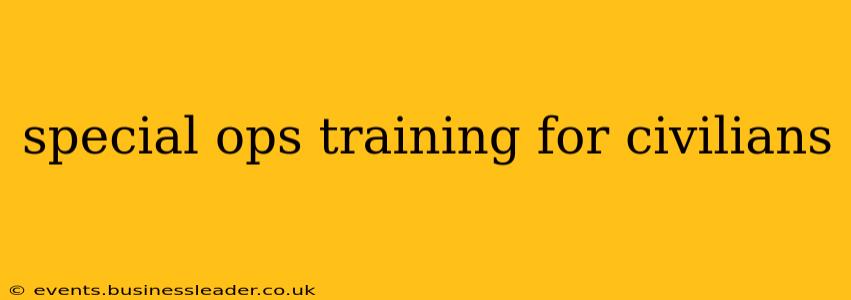The allure of special operations training is undeniable. Hollywood paints a picture of elite warriors, capable of incredible feats of strength, endurance, and tactical prowess. But for civilians, the reality is far more nuanced. While you can't become a Navy SEAL or Green Beret overnight, you can access training that will challenge you physically and mentally, pushing your limits in ways you never thought possible. This guide explores the various avenues for civilians seeking this type of demanding training, while addressing common questions and misconceptions.
What Kind of Special Ops Training is Available to Civilians?
The key is understanding that "special ops training" encompasses a wide range of skills and disciplines. You won't find a program that replicates the full, classified curriculum of a military special forces unit, but many options offer focused training in specific areas. These often include:
-
Fitness and Physical Conditioning: This forms the bedrock of any special operations training. Expect rigorous programs focusing on strength, endurance, cardiovascular health, and agility. Many commercial gyms and specialized fitness programs cater to this demand, often incorporating elements like CrossFit, functional fitness, and calisthenics.
-
Tactical Skills: This can range from basic self-defense and hand-to-hand combat to advanced weapons training (firearms safety is paramount, and proper licensing is essential), navigation, and survival skills. Many private training companies offer courses in these areas, often led by former military personnel.
-
Mental Fortitude Training: Special operations units emphasize mental resilience and stress management. Civilian programs often incorporate elements of mindfulness, resilience training, and psychological preparation to build this crucial aspect.
-
Survival and Wilderness Skills: Courses focused on survival in various environments, from desert to jungle, are commonly available. These often cover topics such as shelter building, fire starting, water procurement, and navigation.
Is Special Ops Training for Civilians Worth It?
The value of special ops-style training for civilians depends entirely on your goals and expectations. It’s not a path to becoming a soldier, but it can provide significant benefits:
-
Improved Physical Fitness: The demanding nature of the training will undoubtedly enhance your physical capabilities.
-
Enhanced Mental Toughness: Overcoming the challenges will build resilience and mental fortitude.
-
Valuable Survival Skills: Learning survival skills can be beneficial in emergencies or outdoor adventures.
-
Increased Self-Confidence: Successfully completing a challenging program can boost self-esteem and confidence.
What are the Risks of Civilian Special Ops Training?
While the benefits can be substantial, it's crucial to acknowledge the potential risks:
-
Physical Injury: The intense physical demands can lead to injuries if proper safety precautions aren't taken and appropriate physical conditioning is not established.
-
Overtraining: Pushing yourself too hard can lead to burnout and injury.
-
Cost: Specialized training can be expensive, depending on the program and its duration.
How Do I Find Reputable Civilian Special Ops Training Programs?
Thorough research is key. Look for programs with:
-
Qualified Instructors: Experienced instructors with relevant backgrounds (e.g., military special forces experience) are crucial.
-
Safety Emphasis: Safety should be a top priority for any reputable program.
-
Clear Curriculum: Understand what the training will entail before enrolling.
-
Positive Reviews: Check online reviews and testimonials from past participants.
What is the Cost of Civilian Special Ops Training?
Costs vary significantly depending on the program, location, and duration. Expect to pay anywhere from a few hundred dollars for a single weekend course to several thousand dollars for a more extensive program.
What is the Best Special Ops Training for Civilians?
There isn't a single "best" program. The ideal choice will depend on your individual goals, fitness level, and budget. Research different options and choose the program that best aligns with your needs and expectations. Remember that your safety and physical limitations should always take precedence.
This information should provide a solid starting point for your exploration of civilian special operations training. Remember to always prioritize safety and choose reputable programs with qualified instructors. The journey to enhance your physical and mental capabilities can be incredibly rewarding, but it's essential to approach it with realism and a focus on responsible training.
